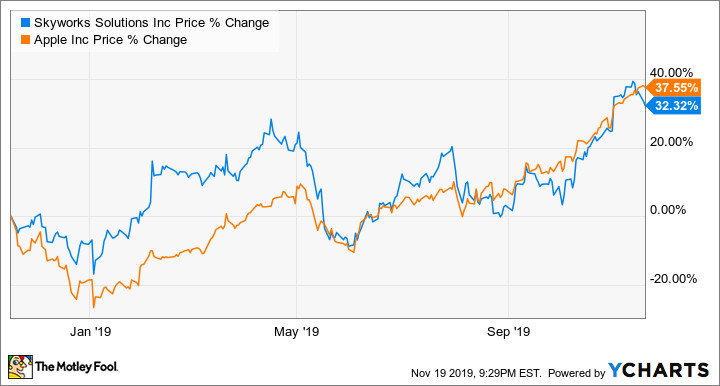The share price of Skyworks Solutions (SWKS 1.83%) has rocketed more than 40% higher so far this year, which is a nice change of pace from 2018, when the stock couldn't stop crashing. Now that the stock has nearly erased last year's losses, it's a good time to reevaluate the company as an investment. Here's a look at how the semiconductor company has done recently, an assessment of the risks it's facing, and the opportunities that it has for growth.
Beating expectations doesn't mean things have been easy
Skyworks is coming off a relatively good fiscal fourth quarter in which it beat expectations for both earnings and revenue. Earnings for the period, which ended Sept. 27, came in at $1.52 per share, compared to the $1.50 per share that was the consensus expectation among analysts, and its $827 million in sales beat the $825 million that was forecast. However, since that report was released on Nov. 12 -- and the stock price set a new 52-week high -- shares of Skyworks have fallen by about 5%.
Although the company outperformed the forecasts, its annual sales fell 12.7% in fiscal 2019. Among the reasons for the decline were declining smartphone demand, as well as the loss of a significant customer when the U.S. Commerce Department placed Chinese tech giant Huawei on its Entity List, effectively preventing U.S. companies from doing business with it. The U.S. has eased some of the restrictions related to certain products which are not considered risks; those can now be sold to Huawei through temporary licenses. The U.S. recently extended that license into February 2020.

Image Source: Getty Images.
The factors that impacted the company's Q4 results continue to weigh on Skyworks. It's forecasting fiscal Q1 sales will come in between $870 million to $890 million, and while that would be an increase from last quarter, it would be a sharp year-over-year decline. The company's fiscal 2019 Q1 revenue was $972 million. Even if its results land near the top end of the estimated range, Skyworks sales will be down at least 8% from a year ago.
Is Skyworks too dependent on a few customers?
Huawei accounted for more than 10% of Skyworks' revenues in fiscal 2017, but two other companies topped that threshold: Apple and Samsung. Its exposure to Apple is far more significant -- during fiscal 2019, its chip sales to the company, including those that were indirect, accounted for 51% of its revenues. And Skyworks' dependency on Apple has been growing: That figure was up from 47% in fiscal 2018 and 39% in 2017.
The link between Apple and Skyworks is even evident in the behavior of their stocks:
If iPhones and iPads are selling well, chances are, Skyworks is doing well by selling chips that go into them.
In addition, two-thirds of Skyworks' accounts receivable balances are owed by just three customers, and it's probably not hard to guess at this point which three those are. And that percentage has risen over the years as well. While there may not be a major collection risk from a receivables standpoint when your largest balances are owed by companies like Samsung and Apple, all it would take is one big dispute to wreak havoc on Skyworks' financials.
Although that may appear an unlikely scenario, exposure to just a few big customers is a risk that investors should be aware of -- and decide if they are comfortable with -- before investing in a company.
Skyworks' growth is all about 5G
A significant reason that investors are excited about Skyworks now is its growth potential, particularly when it comes to 5G. It has many 5G products in the pipeline, and some that have already launched. The new Samsung folding phone, for instance, is currently powered using Skyworks' technology.
But the attractive growth opportunities for the company go far beyond smartphones: Autonomous vehicles, the Internet of Things, and robotics are just a few of the areas where Skyworks sees a lot of potential for its chips.
Key takeaways for investors
Skyworks has some risk in its operations, such as high exposure to the big players in the tech industry, but any chipmaker will face many of those same challenges. Those are necessary evils, unfortunately, that suppliers are going to have to manage as best as they can. But it's also a testament to the quality of its products that Skyworks wins so much business from industry leaders like Apple and Samsung.
Although the stock is coming off a recent high, it trades at 20 times earnings and 4 times its book value. In addition, it boasts some strong financials, and enjoys a great long-term outlook, especially when it comes to 5G. As such, Skyworks stock looks like a good long-term buy, despite the challenges it faces today.





